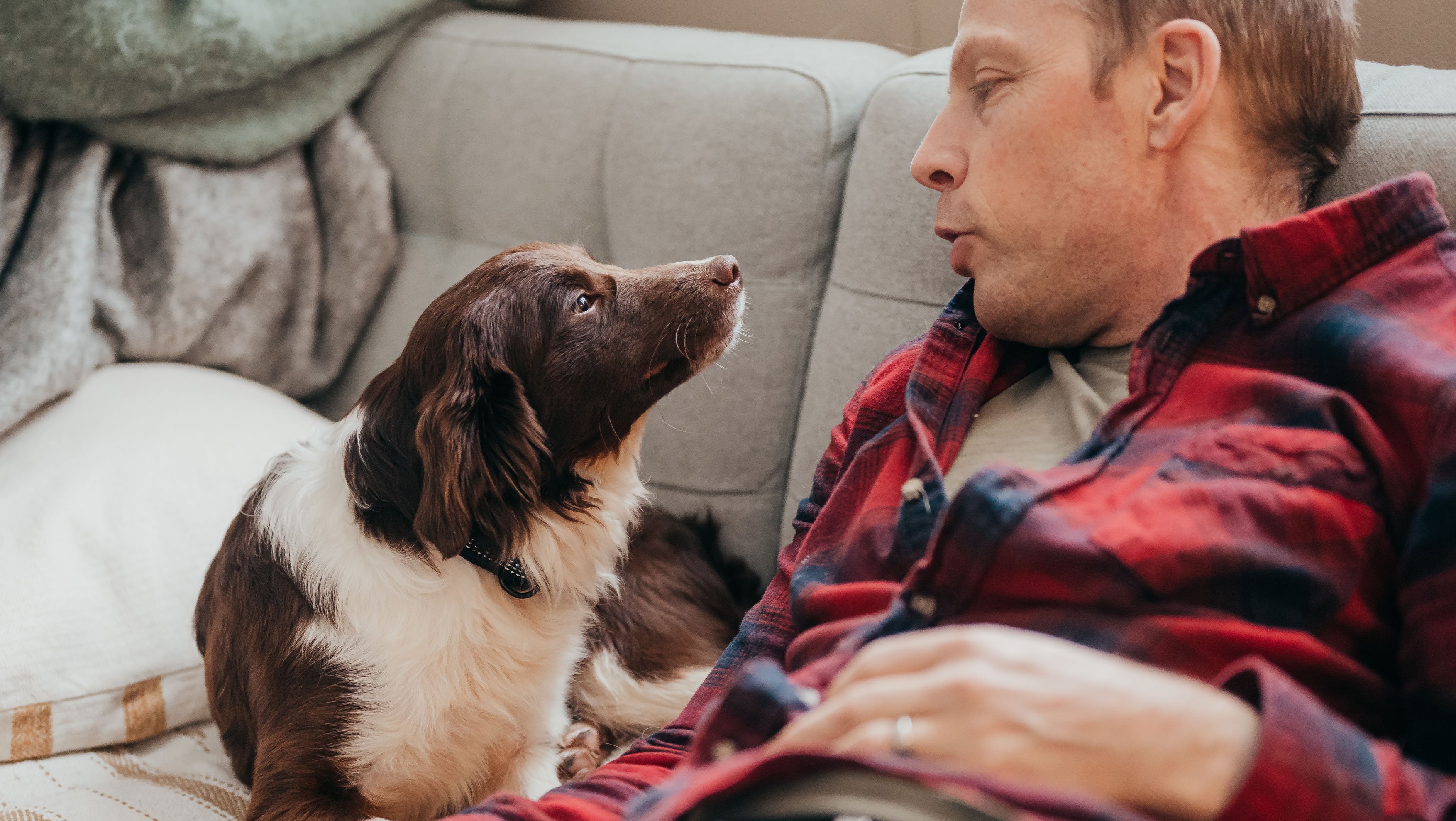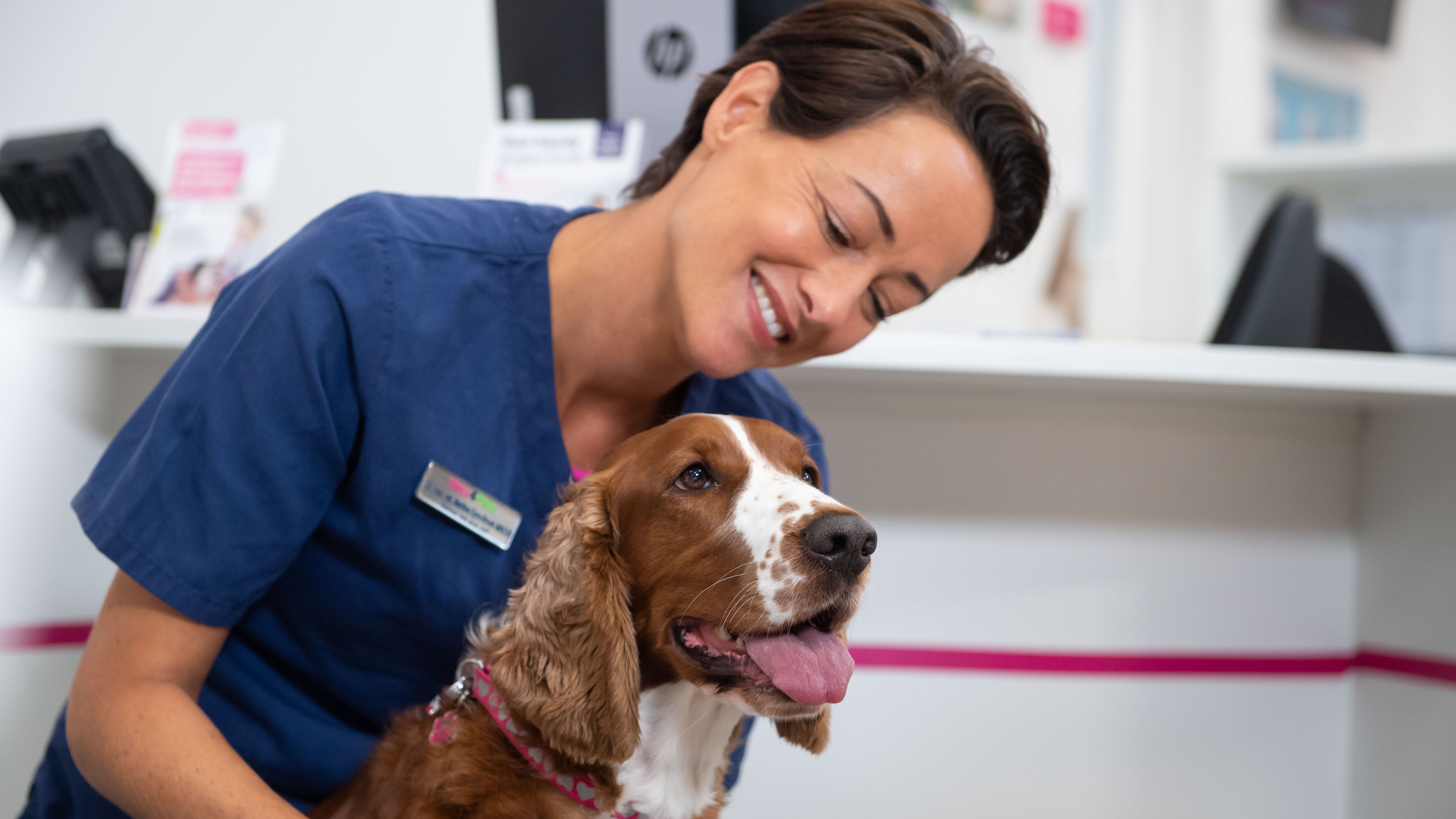
Neutering your dog
We're here to help you decide whether neutering is right for your dog, and at what age it could be done.
Male and female dogs can be neutered to prevent them from breeding. In male dogs, we call this castration and in females, it's spaying.
Other reasons for neutering can include health or behavioural issues that the dog and owner are experiencing.
Neutering is one of the most common routine operations carried out in UK veterinary clinics. And over the years, neutering has advanced. We now recognise that while it can remove the risk of some problems, it could sometime increase the chances of others. Breed, and age at neutering can also affect risk, but every dog is an individual with their own personality and health potential.
What is castration?
Castration is the term we normally use for the surgical removal of a dog’s testes under general anaesthesia.
Why do we castrate male dogs?
People decide to have their dogs castrated for different reasons.
- Population control, preventing him from breeding with females
- Prevention of diseases, such as testicular cancer
- Reduction of unwanted behaviour, such as indoor urine marking
- Retained testicles (cryptorchidism). Sometimes a dog’s testes don’t make it to their intended position within the scrotum, and there’s evidence to show that they’re at higher risk of developing tumours
How is castration performed in dogs?
Castration is always done under general anaesthetic and involves making a small surgical incision in front of the dog’s scrotum, through which the testes are removed. The skin is sealed using stitches that may either need removing after roughly 10 days, or that will dissolve by themselves over a couple of months.
See what happens at a neutering appointment
The role of testosterone in dogs' behaviour
Some behaviour patterns are seen more in male than female dogs, creating some stereotypical traits. Wandering off if they get out of their garden and marking vertical surfaces are two examples of typical ‘male dog’ behaviour.
Male testosterone can be the underpinning motivation behind certain behaviour, but practicing the behaviour turns it into a habit. When a dog is castrated and certain behaviour persists, it’s because the behaviour has been practiced and is now a habit. It’s not prolonged because ‘there’s still some testosterone around’, as is sometimes thought.
A dog’s behaviour is the outcome of many factors, including tendencies that come with their breed, complex neurological, hormonal and physiological events, and all the many thousands of interactions they have with their environment and the people and animals within it. When a dog is castrated, it can have a significant effect on his behaviour.
How might castration affect my dogs' behaviour?
While it used to be believed that aggressive behaviour was supported by testosterone, more recent evidence suggests it’s not that simple!
When we see a dog barking and lunging at other dogs while he’s on his lead and appearing to ‘protect his owner’, much of the problem behaviour we see in dogs is underpinned by anxiety and lack of confidence, and not by attitude.
Timing of castration can also affect behaviour. A 2018 study showed that the sooner dogs were neutered, the less likely they were to howl when left alone and to urine-mark indoors, but the more likely they were to develop other unwanted behaviour, including aggressive behaviour towards other dogs and people.
If you’re considering having your dog castrated to prevent or manage problem behaviour, reach out to your vet to discuss the options in your dog’s individual situation first. Your vet team will be able to link you up with the right help, once medical causes have been ruled out or addressed.
How could castration affect my dog's health?
Although neutering has been shown to extend the lifespan of female dogs on a population level, this hasn’t been proven in males. Castration does however eliminate the risks of testicular cancer, torsion (twisting) and testosterone-supported conditions.
On the other hand, the risk of cruciate disease and certain cancers has been shown to be more common in castrated male dogs.
Many studies have demonstrated that the risk of obesity increases in neutered dogs. There’s also evidence that neutered dogs don’t lose weight as easily as intact ones when they are put on a weight-loss programme. Diabetes mellitus, for which obesity is a recognised risk factor, is reportedly more common in castrated than in intact males.
How do I know whether castration is right for my dog?
If your dog is still a puppy, your vet team will discuss castration with you during a routine appointment around the time of his primary vaccination course. You can, of course, reach out to your vet at any time if you’d like an appointment to talk about whether it’s appropriate for your older dog.
What are the alternatives to surgical castration?
Surgical castration is irreversible. If we want to find out whether castration is the right thing for your dog, we can test this by inserting a small, temporary hormone implant under his skin. By six weeks after implantation, 95% of dogs have reduced blood levels of testosterone and we can begin to see how they might behave if they were surgically castrated.
It's useful to have this ‘trial castration’ option because it can sometimes be tricky to know whether a dog showing unwanted behaviour is likely to improve or get worse following removal of the main source of his testosterone by surgical castration.
- If the implant, together with appropriate training, brings about a happier dog and owner, then surgical castration may be the right plan going forwards.
- If, on the other hand, a dog’s behaviour becomes more difficult while he is wearing the temporary implant, we know that surgical castration is also likely to make things worse and that behavioural support (following a thorough check for medical reasons for the behaviour) is needed.
What is spaying?
In the UK, spaying refers to either of two operations to prevent female animals from breeding. Traditionally, spaying has involved surgical removal of both ovaries and the uterus (womb) through an incision in the midline of the female dog’s abdomen. In recent years, with the now-common practice of laparoscopic (keyhole) surgery, removal of just the ovaries (conventionally or laparoscopically) is becoming popular.
Why do we spay female dogs?
Spaying prevents a female dog from coming into season or becoming pregnant, and it also removes or reduces the risk of certain diseases.
What happens when a female dog is spayed?
Spaying is performed under general anaesthesia and usually involves staying at the clinic for the day. Before your dog comes to have her surgery, you’ll be able to discuss it with your vet so that you understand exactly which procedure has been recommended for her and what to expect.
See what happens at a neutering appointment
When is the right time to spay?
There are arguments for spaying female dogs before they’ve had their first season, and also equally strong reasons to perform the procedure once they have undergone puberty and had their first season. Your vet will be able to talk these through with you, so you understand the possible pros and cons associated with each.
If your dog has already begun to have seasons, your vet will normally recommend waiting 12 to 16 weeks from the start of the most recent season before spaying, to minimise the risk of performing the procedure while a pseudopregnancy could be underway. More about this below, where we discuss spaying and behaviour.
How can spaying affect female dogs' health?
Several studies have shown that spaying is likely to be associated with longer life. It’s possible that spaying could be a sign of better care in general, which might also be expected to influence a dog’s lifespan. While spaying is associated with an increased risk of certain health problems, it can prevent or entirely remove the chances of other serious conditions. When we’re looking at the risk of diseases, it’s important to remember that even if the chances of an event are doubled or tripled, this could still mean very low numbers in real terms.
Advantages of being spayed
- Removing your dog’s ovaries means she will never develop ovarian cancer
- She will no longer come into season
- She won’t be able to become pregnant or develop pseudopregnancy (phantom pregnancy)
- Eliminates the risk of pyometra, a life-threatening uterus infection
- Chance of mammary tumours (breast cancer) are likely to reduce
Possible disadvantages of being spayed
- Increased risk of developing certain types of tumours
- Possible risk of joint disease issues
- Hip and elbow dysplasia risk may increase after neutering
- Osteoarthritis risk may increase after neutering
- Urinary incontinence risk may increase after neutering
- Obesity has been shown to be more likely in neutered dogs
How do I know whether spaying is right for my dog?
Your vet will be able to talk you through the risks versus the benefits of spaying, including timing. We know that there is a strong argument for spaying female dogs, based on available evidence. However, there is no 100% right answer and it’s important to weigh up the possible pros and cons for each individual dog’s situation.
Are there alternatives to spaying?
There are some temporary medical alternatives to spaying, which can be used to prevent working dogs intended for future breeding from coming into season during critical work periods. These can be associated with a higher risk of certain serious health problems and shouldn’t be relied upon as a means of pregnancy prevention, or for long-term use. Surgical spaying is the only recommended long-term solution. Your vet will be happy to discuss the risks and possible benefits of these alternatives for your pet if you’re considering them.
Health Plans to keep your dog healthy
At Vets4Pets we offer a range of Health Plans that make essential routine treatments more affordable. You'll save money on things like annual vaccinations, flea and worm treatment and routine health check-ups.

Dog Advice
Read more of our expert dog advice to keep your dog happy and healthy.
